- Home
- Michael Chabon
The Yiddish Policemen's Union Page 2
The Yiddish Policemen's Union Read online
Page 2
“Want me to go with you?” Tenenboym says, sounding offhand, but you never know with a sensitive old fishwife like Tenenboym.
Landsman affects to scorn the offer. “Just give me a damn flashlight,” he says.
The basement exhales its breath of camphor, heating oil, and cold dust. Landsman jerks a string that lights a naked bulb, holds his breath, and goes under.
At the bottom of the steps, he passes through the lost-articles room, lined with pegboard, furnished with shelves and cubbyholes that hold the thousand objects abandoned or forgotten in the hotel. Unmated shoes, fur hats, a trumpet, a windup zeppelin. A collection of wax gramophone cylinders featuring the entire recorded output of the Orchestra Orfeon of Istanbul. A logger’s ax, two bicycles, a partial bridge in a hotel glass. Wigs, canes, a glass eye, display hands left behind by a mannequin salesman. Prayer books, prayer shawls in their velvet zipper pouches, an outlandish idol with the body of a fat baby and the head of an elephant. There is a wooden soft-drink crate filled with keys, another with the entire range and breadth of hairstyling tools, from irons to eyelash crimpers. Framed photographs of families in better days. A cryptic twist of rubber that might be a sex toy, or a contraceptive device, or the patented secret of a foundation garment. Some yid even left behind a taxidermy marten, sleek and leering, its glass eye a hard bead of ink.
Landsman probes the box of keys with a pencil. He looks inside each hat, gropes along the shelves behind the abandoned paperback books. He can hear his own heart and smell his own aldehyde breath, and after a few minutes in the silence, the sound of blood in his ears begins to remind him of somebody talking. He checks behind the hot-water tanks, lashed to one another with straps of steel like comrades in a doomed adventure.
The laundry is next. When he pulls the string for the light, nothing happens. It’s ten degrees darker in here, and there’s nothing to see but blank walls, severed hookups, drain holes in the floor. The Zamenhof has not done its own wash in years. Landsman looks into the drain holes, and the darkness in them is oily and thick. Landsman feels a flutter, a worm, in his belly. He flexes his fingers and cracks the bones of his neck. At the far end of the laundry room, a door that is three planks nailed together by a diagonal fourth seals a low doorway. The wooden door has a loop of rope for a latch and a peg to hook it on.
A crawl space. Landsman half dreads the phrase alone.
He calculates the chance that a certain style of killer, not a professional, not a true amateur, not even a normal maniac, might be hiding in that crawl space. Possible; but it would be pretty tough for the freak to have hooked the loop over the peg from inside. That logic alone is almost enough to persuade him not to bother with the crawl space. In the end Landsman switches on the flash and notches it between his teeth. He hikes up his pants legs and gets down on his knees. Just to spite himself, because spiting himself, spiting others, spiting the world is the pastime and only patrimony of Landsman and his people. With one hand he unholsters his big little S&W, and with the other he fingers the loop of rope. He yanks open the door of the crawl space.
“Come out,” he says, lips dry, rasping like a scared old fart.
The elation he experienced on the roof has cooled like blown filament. His nights are wasted, his life and career a series of mistakes, his city itself a bulb that is about to go black.
He thrusts his upper body into the crawl space. The air is cold, with a bitter smell of mouse shit. The beam of the pocket flash dribbles over everything, shadowing as much as it reveals. Walls of cinder block, an earthen floor, the ceiling a loathsome tangle of wires and foam insulation. In the middle of the dirt floor, at the back, a disk of raw plywood lies set in a circular metal frame, flush with the floor. Landsman holds his breath and swims through his panic to the hole in the floor, determined to stay under for as long as he can. The dirt around the frame is undisturbed. An even layer of dust lies over wood and metal alike, no marks, no streaks. There is no reason to think anyone has been fooling with it. Landsman fits his fingernails between the plywood and the frame and pries off the crude hatch. The flashlight reveals a threaded tube of aluminum screwed into the earth, laddered with steel cleats. The frame turns out to be the edge of the tube itself. Just wide enough to admit a full-grown psychopath. Or a Jewish policeman with fewer phobias than Landsman. He clings to the sholem as to a handle, wrestling with a crazy need to fire it into the throat of the darkness. He drops the plywood disk back into its frame with a clatter. No way is he going down there.
The darkness follows him all the way back up the stairs to the lobby, reaching for his collar, tugging at his sleeve.
“Nothing,” he tells Tenenboym, pulling himself together. He gives the word a cheery ring. It might be a prediction of what his investigation into the murder of Emanuel Lasker is bound to reveal, a statement of what he believes Lasker lived for and died for, a realization of what will remain, after the Reversion, of Landsman’s hometown. “Nothing.”
“You know what Kohn says,” says Tenenboym. “Kohn says we got a ghost in the house.” Kohn is the day manager. “Taking shit, moving shit around. Kohn figures it for the ghost of Professor Zamenhof.”
“If they named a dump like this after me,” Landsman says, “I’d haunt it, too.”
“You never know,” Tenenboym observes. “Especially nowadays.”
Nowadays one never knows. Out at Povorotny, a cat mated with a rabbit and produced adorable freaks whose photos graced the front page of the Sitka Tog. Last February five hundred witnesses all up and down the District swore that in the shimmer of the aurora borealis, for two nights running, they observed the outlines of a human face, with beard and sidelocks. Violent arguments broke out over the identity of the bearded sage in the sky, whether or not the face was smiling (or merely suffering from a mild attack of gas), and the meaning of the weird manifestation. And just last week, amid the panic and feathers of a kosher slaughterhouse on Zhitlovsky Avenue, a chicken turned on the shochet as he raised his ritual knife and announced, in Aramaic, the imminent advent of Messiah. According to the Tog, the miraculous chicken offered a number of startling predictions, though it neglected to mention the soup in which, having once more fallen silent as God Himself, it afterward featured. Even the most casual study of the record, Landsman thinks, would show that strange times to be a Jew have almost always been, as well, strange times to be a chicken.
3
In the street the wind shakes rain from the flaps of its overcoat. Landsman tucks himself into the hotel doorway. Two men, one with a cello case strapped to his back, the other cradling a violin or viola, struggle against the weather toward the door of Pearl of Manila across the street. The symphony hall is ten blocks and a world away from this end of Max Nordau Street, but the craving of a Jew for pork, in particular when it has been deep-fried, is a force greater than night or distance or a cold blast off the Gulf of Alaska. Landsman himself is fighting the urge to return to room 505, and his bottle of slivovitz, and his World’s Fair souvenir glass.
Instead, he lights a papiros. After a decade of abstinence, Landsman took up smoking again not quite three years ago. His then-wife was pregnant at the time. It was a much-discussed and in some quarters a long-desired pregnancy—her first—but not a planned one. As with many pregnancies that are discussed too long there was a history of ambivalence in the prospective father. At seventeen weeks and a day—the day Landsman bought his first package of Broadways in ten years—they got a bad result. Some but not all of the cells that made up the fetus, code-named Django, had an extra chromosome on the twentieth pair. A mosaicism, it was called. It might cause grave abnormalities. It might have no effect at all. In the available literature, a faithful person could find encouragement, and a faithless one ample reason to despond. Landsman’s view of things—ambivalent, despondent, and with no faith in anything—prevailed. A doctor with half a dozen laminaria dilators broke the seal on the life of Django Landsman. Three months later, Landsman and his cigarettes moved out of the house
on Tshernovits Island that he and Bina had shared for nearly all the fifteen years of their marriage. It was not that he couldn’t live with the guilt. He just couldn’t live with it and Bina, too.
An old man, pushing himself like a rickety handcart, weaves a course toward the door of the hotel. A short man, under five feet, dragging a large valise. Landsman observes the long white coat, worn open over a white suit with a waistcoat, and the wide-brimmed white hat pulled down over his ears. A white beard and sidelocks, wispy and thick at the same time. The valise an ancient chimera of stained brocade and scratched hide. The whole right side of the man’s body sags five degrees lower than the left, where the suitcase, which must contain the old boy’s entire collection of lead ingots, weighs it down. The man stops and raises a finger, as if he has a question to pose of Landsman. The wind toys with the man’s whiskers and with the brim of his hat. From his beard, armpits, breath, and skin, the wind plucks a rich smell of stale tobacco and wet flannel and the sweat of a man who lives in the street. Landsman notes the color of the man’s antiquated boots, yellowish ivory, like his beard, with sharp toes and buttons running up the sides.
Landsman recalls that he used to see this nut a lot, back when he was arresting Tenenboym for petty theft and possession. The yid was no younger then and is no older now. People used to call him Elijah, because he turned up in all kinds of unlikely spots, with his pushke box and his indefinable air of having something important to say.
“Darling,” he says to Landsman now. “This is the Hotel Zamenhof, no?”
His Yiddish sounds a bit exotic to Landsman, flavored with Dutch maybe. He is bent and frail, but his face, apart from crow’s-feet around the blue eyes, looks youthful and unlined. The eyes themselves hold a match flame of eagerness that puzzles Landsman. The prospect of a night at the Zamenhof does not often give rise to such anticipation.
“That’s right.” Landsman offers Elijah the Prophet a Broadway, and the little man takes two and tucks one into the reliquary of his breast pocket. “Hot and cold water. Licensed shammes right on the premises.”
“Are you the manager, sweetness?”
Landsman can’t help smiling at that. He steps aside, gesturing toward the door. “The manager’s inside,” he says.
But the little man just stands there getting rained on, his beard fluttering like a flag of truce. He gazes up at the faceless face of the Zamenhof, gray in the murky streetlight. A narrow pile of dirty white brick and slit windows, three or four blocks off the tawdriest stretch of Monastir Street, the place has all the allure of a dehumidifier. Its neon sign blinks on and off, tormenting the dreams of the losers across the street at the Blackpool.
“The Zamenhof,” the old man says, echoing the intermittent letters on the neon sign. “Not the Zamenhof. The Zamenhof.”
Now the latke, a rookie named Netsky, comes jogging up, holding on to his round, flat, wide-brimmed patrolman’s hat.
“Detective,” the latke says, out of breath, and then gives the old man a squint and a nod. “Evening, Grandpa. Right, uh, Detective, sorry, I just got the call, I was hung up for a minute there.” Netsky has coffee on his breath and powdered sugar on the right cuff of his blue coat. “Where’s the dead yid?”
“In two-oh-eight,” Landsman says, opening the door for the latke, then turning back to the old man. “Coming in, Grandpa?”
“No,” Elijah says, with a hint of mild emotion that Landsman can’t quite read. It might be regret, or relief, or the grim satisfaction of a man with a taste for disappointment. The flicker trapped in the old man’s eyes has given way to a film of tears. “I was only curious. Thank you, Officer Landsman.”
“It’s Detective now,” Landsman says, startled that the old man has retrieved his name. “You remember me, Grandpa?”
“I remember everything, darling.” Elijah reaches into a hip pocket of his bleach yellow coat and takes out his pushke, a wooden casket, about the size of a box meant for index cards, painted black. On the front of the box, Hebrew words are painted: L’ERETZ YISROEL. Cut into the top of the box is a narrow slit for coins or a folded dollar bill. “A small donation?” Elijah says.
The Holy Land has never seemed more remote or unattainable than it does to a Jew of Sitka. It is on the far side of the planet, a wretched place ruled by men united only in their resolve to keep out all but a worn fistful of small-change Jews. For half a century, Arab strongmen and Muslim partisans, Persians and Egyptians, socialists and nationalists and monarchists, pan-Arabists and pan-Islamists, traditionalists and the Party of Ali, have all sunk their teeth into Eretz Yisroel and worried it down to bone and gristle. Jerusalem is a city of blood and slogans painted on the wall, severed heads on telephone poles. Observant Jews around the world have not abandoned their hope to dwell one day in the land of Zion. But Jews have been tossed out of the joint three times now—in 586 BCE, in 70 CE and with savage finality in 1948. It’s hard even for the faithful not to feel a sense of discouragement about their chances of once again getting a foot in the door.
Landsman gets out his wallet and pokes a folded twenty into Elijah’s pushke. “Lots of luck,” he says.
The little man hoists his heavy valise and starts to shuffle away. Landsman reaches out and pulls at Elijah’s sleeve, a question formulating in his heart, a child’s question about the old wish of his people for a home. Elijah turns with a look of practiced wariness. Maybe Landsman is some kind of troublemaker. Landsman feels the question ebb away like the nicotine in his bloodstream.
“What you got in the bag, Grandpa?” Landsman says. “Looks heavy.”
“It’s a book.”
“One book?”
“It’s very big.”
“Long story?”
“Very long.”
“What’s it about?”
“It’s about Messiah,” Elijah says. “Now please take your hand off of me.”
Landsman lets go. The old man straightens his back and raises his head. The clouds on his eyes blow over, and he looks angry, disdainful, and not in the least old.
“Messiah is coming,” he says. It isn’t quite a warning and yet somehow as a promise of redemption, it lacks a certain warmth.
“That works out well,” Landsman says, jerking his thumb toward the hotel lobby. “As of tonight we have a vacancy.”
Elijah looks hurt, or maybe just disgusted. He opens the black box and looks inside. He takes out the twenty-dollar bill that Landsman gave him and hands it back. Then he picks up his suitcase, settles his floppy white hat down over his head, and trudges off into the rain.
Landsman crumples the twenty and drops it into his hip pocket. He grinds his papiros under his shoe and goes into the hotel.
“Who’s the nut?” Netsky says.
“They call him Elijah. He’s harmless,” says Tenenboym from behind the steel mesh of the reception window. “You used to see him around sometimes. Always pimping for Messiah.” Tenenboym clacks a gold toothpick against his molars. “Listen, Detective, I’m not supposed to say anything. But I might as well tell you. Management is sending out a letter tomorrow.”
“I can’t wait to hear this,” Landsman says.
“The owners sold out to a Kansas City concern.”
“They’re tossing us.”
“Maybe,” Tenenboym says. “Maybe not. Nobody’s status is clear. But it’s not out of the question that you might have to move out.”
“Is that what it’s going to say in the letter?”
Tenenboym shrugs. “The letter’s all written in lawyer.”
Landsman puts Netsky the latke on the front door. “Don’t tell them what they heard or saw,” he reminds him. “And don’t give them a hard time, even if they look like they could use one.”
Menashe Shpringer, the criminalist working the graveyard shift, blows into the lobby in a black coat and fur hat, with a rattling of rain. In one hand Shpringer carries a dripping umbrella. With the other he tows a chrome caddy to which his black vinyl toolbox and a plastic bin, w
ith holes for handles, are strapped with bungee cord. Shpringer is a fireplug, his bowed legs and simian arms affixed to his neck without apparent benefit of shoulders. His face is mostly jowl and his ridged forehead looks like one of those domed beehives you see representing Industry in medieval woodcuts. The bin is blazoned with the single word EVIDENCE in blue letters.
“Are you leaving town?” Shpringer says. It’s not an uncommon greeting these days. A lot of people have left town in the past couple of years, fled the District for the short roster of places that will welcome them, or that have tired of hearing about pogroms secondhand and are hoping to throw one for themselves. Landsman says that as far as he knows, he is not going anywhere. Most of the places that will take Jews require that you have a near relative living there. All of Landsman’s nearest relatives are dead or facing Reversion themselves.
“Then let me say goodbye to you now, forever,” Shpringer says. “Tomorrow night at this time I will be basking in the warm Saskatchewan sun.”
“Saskatoon?” Landsman guesses.
“Thirty below they had today,” Shpringer says. “That was the high.”
“Look at it this way,” Landsman says. “You could be living in this dump.”
“The Zamenhof.” In his memory, Shpringer pulls Landsman’s file, and frowns at its contents. “That’s right. Home sweet home, eh?”
“It suits me in my current style of life.”
Shpringer smiles a thin smile from which almost every trace of pity has been erased.
“Which way to the dead man?” he says.
4
First thing Shpringer screws in all the lightbulbs that Lasker loosened. Then he lowers his safety glasses and goes to work. He gives Lasker a manicure and pedicure and looks inside his mouth for a severed finger or a bronze doubloon. He lifts prints with his dust and brush. He takes 317 Polaroids. He takes pictures of the corpse, the room, the perforated pillow, the fingerprints he has raised. He takes a picture of the chessboard.

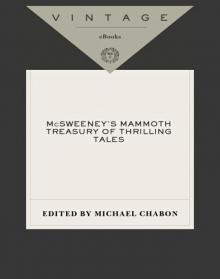 McSweeney's Mammoth Treasury of Thrilling Tales
McSweeney's Mammoth Treasury of Thrilling Tales The Amazing Adventures of Kavalier & Clay
The Amazing Adventures of Kavalier & Clay The Yiddish Policemen's Union
The Yiddish Policemen's Union Wonder Boys
Wonder Boys Manhood for Amateurs
Manhood for Amateurs Kingdom of Olives and Ash: Writers Confront the Occupation
Kingdom of Olives and Ash: Writers Confront the Occupation Gentlemen of the Road: A Tale of Adventure
Gentlemen of the Road: A Tale of Adventure A Model World and Other Stories
A Model World and Other Stories Pops: Fatherhood in Pieces
Pops: Fatherhood in Pieces McSweeney's Enchanted Chamber of Astonishing Stories
McSweeney's Enchanted Chamber of Astonishing Stories Summerland
Summerland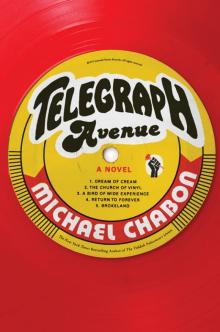 Telegraph Avenue
Telegraph Avenue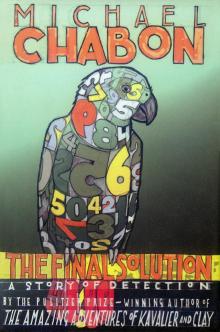 The Final Solution
The Final Solution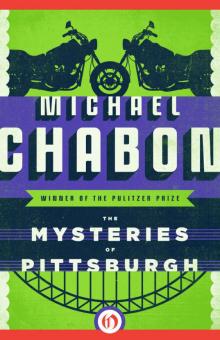 The Mysteries of Pittsburgh
The Mysteries of Pittsburgh Werewolves in Their Youth
Werewolves in Their Youth Bookends
Bookends Fight of the Century
Fight of the Century Maps and Legends
Maps and Legends The Amazing Adventures of Kavalier & Clay (with bonus content)
The Amazing Adventures of Kavalier & Clay (with bonus content) Kingdom of Olives and Ash
Kingdom of Olives and Ash Pops
Pops Gentlemen of the Road
Gentlemen of the Road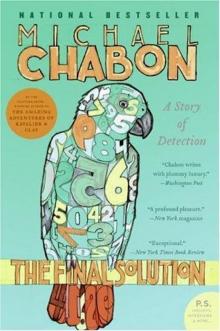 The Final Solution: A Story of Detection
The Final Solution: A Story of Detection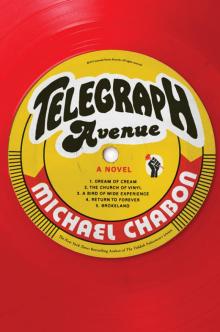 Telegraph Avenue: A Novel
Telegraph Avenue: A Novel